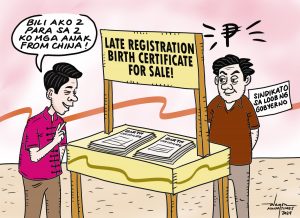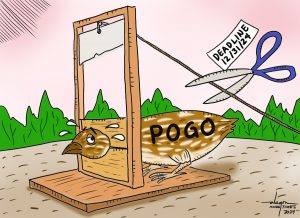By Herman M. Lagon
Red-tagging has sparked heated debate lately due to the Supreme Court decision this Wednesday, May 8, 2024. The term has progressed from a simple descriptor to a grave charge that could affect people’s lives. For everyone, most especially for those of us involved in government and public service, a nuanced comprehension of this complicated matter is required.
The National Task Force to End Local Communist Armed Conflict (NTF-ELCAC) understandably claims that communist organizations employ red-tagging as a means of self-defense, hiding their identities and activities. According to Vice Chair Hermogenes Esperon Jr., a former chief of staff of the AFP himself, many are trying to divert attention away from the alleged crimes committed by these groups by painting their conduct in a negative light.
But our very own Supreme Court has recently illuminated red-tagging’s darker side. As it has been stated, the right to life, liberty, and security can be jeopardized by such acts. The court, through its verdict in favor of Ilonggo activist Siegfred Deduro, has taken this approach after seeing red-tagging lead to unjust surveillance, harassment, and even physical harm to the tagged individuals. Judgment like this highlights the importance of keeping human rights and national security in check.
The intelligence and military communities have an essential role in keeping our country safe. Under intense pressure, these institutions must make tough decisions facing complicated dangers. Their job is vital when it comes to defending our nation from actual terrorist and extremist threats. Respect for human rights, among other principles upon which our nation is founded, is fundamental to their mission, as is the defense of territorial or sovereign spaces.
Building a nation requires active participation from the community and efforts to promote peace. Beyond merely resolving conflicts, these endeavors entail establishing long-term settings where mutual understanding and conversation flourish instead of animosity and distrust. To promote a culture of peace consistent with our constitutional principles, cooperative coexistence, and reconciliation education in communities should be comprehensive and done in meaningful ways.
A strong sense of patriotism permeates this conversation. The democratic principles and human rights that characterize our nation and its physical borders must be safeguarded. This patriotism is shown by being open and honest, being accountable for one’s activities, and following the rule of law. These values ensure that everything is done fairly and justly, even for national security.
So, red-tagging is not merely a labeling or security issue. What matters most is that we do not infringe upon the rights we have sworn to defend in our haste to serve, defend, and protect the country. It is about avoiding fostering an environment of fear and repression while we combat legitimate threats.
Given this context, the Supreme Court’s interventions stand out. They remind us that the judiciary is there to protect our rights by checking the executive and legislative branches and making sure everything is in accordance with the safeguards laid out in the Constitution.
Engaging in open and honest debates that respect diverse opinions and seek to bridge differences is crucial as we traverse this complex landscape. This method will strengthen our national fabric and enhance our shared understanding.
It is important to think about the potential threats to our democracy in the near and far future if we want a strong nation to be safe and secure in the long run. Everybody hopes to live in a society that respects and encourages differing viewpoints, rather than silencing them, and in which the rule of law supports, protects, and empowers, rather than represses, oppresses, or represses.
The military’s responsibility to protect the nation is vital, but they are also well aware that they must adhere to the Constitution at all times. Our shared duty is to keep the democratic principles we fight for intact in the face of national security initiatives. A more secure, equitable, and united Philippines is possible if we tackle the complex path to peace and security with a balanced and informed mindset. With this, I continue to give my snappy salute to all the honest and dedicated individuals in camouflage and black robes.
***
Doc H fondly describes himself as a ‘student of and for life’ who, like many others, aspires to a life-giving and why-driven world that is grounded in social justice and the pursuit of happiness. His views herewith do not necessarily reflect those of the institutions he is employed or connected with.
reflect those of the institutions he is employed or connected with.


